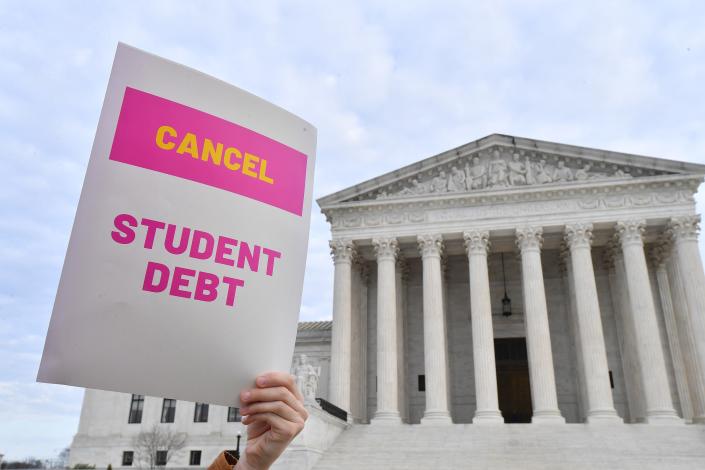President Joe Biden promised to forgive a portion of student loan debt when he was on the campaign trail. His plan debuted last August.
It’s been under fire ever since.
Now it faces the Supreme Court, where it could come undone over whether Biden overstepped his authority.
Just why is the administration being sued? Two borrowers said Biden didn’t give them enough debt relief. Six conservative states said a state-created entity that services student loans faces lost revenue because of Biden’s plan.
Biden’s case does have a shot: A majority of justices could say the wrong plaintiffs sued, for the wrong reasons.
Borrowers probably won’t learn what will become of their debts for several months.
Is Biden’s student debt forgiveness plan dead? Four questions the Supreme Court could answer
Who is Biden aiming to help with mass debt forgiveness?
Biden proposed wiping away $20,000 worth of debt for borrowers who also used a Pell Grant to pay tuition. Pell Grants are awarded to students from low-income families. He also wants to erase $10,000 in debt for most other borrowers.
Only borrowers with an income less than $125,000, or $250,000 for married couples, would be able to have any debt forgiven.
Blueprint for college financing: Find more about options from savings plans to student loans.
Is it too late to apply for student loan forgiveness?
For now, yes.
About 26 million people applied for relief before lawsuits stopped the entire program in its tracks. And of those, 16 million were approved to have a portion, or depending on their balance, all their debt erased.
Even applying for the relief isn’t possible after two federal courts blocked the plan for different legal reasons last fall.
About 40 million Americans were estimated to be eligible for the program.
Student debt relief blocked: It could harm Black and Latino families the most
When will the Supreme Court decide the fate of Biden’s student loan debt forgiveness plan?
They could issue an opinion any time, and they are likely to do so by the end of June.
Story continuesWhat’s the Biden administration’s Plan B if the high court permanently blocks it?
“We are not deliberating or considering any other kind of alternative approach,” said Bharat Ramamurti, deputy director of the National Economic Council, said in January. “We’re fully committed to the approach that the Education secretary used in this case, and we’re confident in our legal authority.”
Red states, blue states: Where do beneficiaries of Biden’s student loan forgiveness plan live?
Are there other ways to have student loan debt forgiven?
Yes.
Borrowers who work in public sector jobs, for example, can apply for Public Service Loan Forgiveness. Nearly anyone, depending on their income, can enroll in a plan that cuts payments and erases what balance is left after a set number of years of making payments, in what’s known as income-driven repayment.
People who attended colleges that misled them about their opportunities after graduation or suddenly closed can apply to have their debts erased, too.
Other ways to cut or lower student loan bills: Millions of borrowers have had billions in student loan debt erased. Here’s how.
What about the payment pause?
Regardless of what happens in the Supreme Court, payments on federal student loans remain paused. Additionally, interest rates on these loans are set at zero percent and collections agencies have stopped attempting to collect overdue debts.
Payments could remain paused through August, but it depends on when the court issues its decision.
Student loan payments are set to restart: Here’s how borrowers should prepare.
What about students who are still in school?
Only loans issued before June 30, 2022, qualify for Biden’s debt forgiveness plan. That means students who just started their studies and who borrowed this year are ineligible for the plan, no matter what happens in court.
If Biden’s plan does go through, will I be taxed?
It depends on the state you live in. The federal government will not tax the relief.
Do you have to pay taxes on student loan forgiveness? Yes, if you live in these 7 states
Contributing: John Fritze, USA TODAY
Contact Chris Quintana at (202) 308-9021 or [email protected]. Follow him on Twitter at @CQuintanadc
Connect with Nirvi Shah at [email protected] or on Twitter: @NirviShah
This article originally appeared on USA TODAY: Student loan forgiveness before Supreme Court: What you need to know
